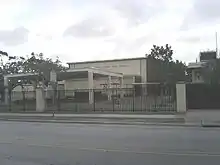Miami Springs, Florida | |
|---|---|
| City of Miami Springs | |
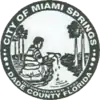 Seal | |
| Motto: At the Heart of it All! | |
 Location in Miami-Dade County and the state of Florida | |
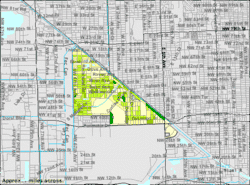 U.S. Census Bureau map showing city limits | |
| Coordinates: 25°49′11″N 80°17′28″W / 25.81972°N 80.29111°W | |
| Country | |
| State | |
| County | |
| Incorporated | August 23, 1926 |
| Government | |
| • Type | Council-Manager |
| • Mayor | Maria Puente Mitchell |
| • Vice Mayor | Title is held through rotation |
| • Councilmembers | Jorge Santin Jacky Bravo Walter Fajet Victor Vazquez |
| • City Manager | Interim Manager Tammy Romero |
| • City Clerk | Erika Gonzalez-Santamaria |
| Area | |
| • Total | 2.98 sq mi (7.73 km2) |
| • Land | 2.88 sq mi (7.46 km2) |
| • Water | 0.11 sq mi (0.27 km2) |
| Elevation | 6 ft (2 m) |
| Population | |
| • Total | 13,859 |
| • Density | 4,813.82/sq mi (1,858.78/km2) |
| Time zone | UTC-5 (EST) |
| • Summer (DST) | UTC-4 (EDT) |
| ZIP codes | 33166, 33142 (Miami) |
| Area code(s) | 305, 786, 645 |
| FIPS code | 12-45200[3] |
| GNIS feature ID | 0286762[4] |
| Website | www |
.jpg.webp)
Miami Springs is a city in Miami-Dade County, Florida, United States. The city is part of the Miami metropolitan area of South Florida. As of 2020, the population recorded by the U.S. Census Bureau was 13,859.
History
The city was founded by Glenn Hammond Curtiss, "The Father of Naval Aviation", and James Bright, during the famous "land boom" of the 1920s and was originally named "Country Club Estates". It, along with other cities in Miami-Dade County such as Coral Gables and Opa-locka, formed some of the first planned communities in the state. Like its counterparts, the city had an intended theme which in its case, was to reflect a particular architecture and ambiance.
In this case it was a regional style of architecture called Pueblo Revival developed in the American Southwest, primarily New Mexico, and incorporating design elements of pueblo architecture. Other buildings incorporated Mission-style design. In fact, the original Hotel Country Club was designed to resemble a pueblo village.[5]
Shortly prior to incorporation in 1926, the city was renamed after a spring located in the area which provided parts of Miami with fresh water until the mid-1990s.
Geography
Miami Springs is located northwest of downtown Miami at 25°49′11″N 80°17′28″W / 25.819725°N 80.291071°W.[6] It is bordered to the northeast by the city of Hialeah and to the southwest by the village of Virginia Gardens. U.S. Route 27 runs parallel to the Miami Springs/Hialeah border. It leads east 6 miles (10 km) to its southern terminus at U.S. Route 1 in Wynwood, Miami, and northwest 4 miles (6 km) to Hialeah Gardens. To the south Miami Springs is bordered by Miami International Airport.
According to the United States Census Bureau, Miami Springs has a total area of 3.0 square miles (7.8 km2). 2.9 square miles (7.5 km2) of it are land and 0.1 square miles (0.26 km2) of it (3.55%) are water.[1]
The core of Miami Springs (excluding the more recently annexed areas) is roughly shaped as a triangle with three definable sides. Northwest 36th Street forms most of the southern boundary, while the Miami River canal forms the northern/eastern boundary. Finally, the Ludlam Canal and Florida East Coast Railroad Yard delimit the western boundary.
Surrounding areas
- Hialeah
- Medley


 Miami
Miami - Unincorporated Miami-Dade County, Virginia Gardens

 Hialeah, Miami, Unincorporated Miami-Dade County
Hialeah, Miami, Unincorporated Miami-Dade County - Unincorporated Miami-Dade County


 Unincorporated Miami-Dade County
Unincorporated Miami-Dade County - Virginia Gardens, Miami International Airport
Demographics
| Census | Pop. | Note | %± |
|---|---|---|---|
| 1930 | 402 | — | |
| 1940 | 898 | 123.4% | |
| 1950 | 5,108 | 468.8% | |
| 1960 | 11,229 | 119.8% | |
| 1970 | 13,279 | 18.3% | |
| 1980 | 12,350 | −7.0% | |
| 1990 | 13,268 | 7.4% | |
| 2000 | 13,712 | 3.3% | |
| 2010 | 13,809 | 0.7% | |
| 2020 | 13,859 | 0.4% | |
| U.S. Decennial Census[7] | |||
2020 census
| Race | Number | Percentage |
|---|---|---|
| White (NH) | 2,526 | 18.23% |
| Black or African American (NH) | 107 | 0.77% |
| Native American or Alaska Native (NH) | 13 | 0.09% |
| Asian (NH) | 131 | 0.95% |
| Pacific Islander or Native Hawaiian (NH) | 2 | 0.01% |
| Some other race (NH) | 42 | 0.30% |
| Two or more races/Multiracial (NH) | 147 | 1.06% |
| Hispanic or Latino (any race) | 10,891 | 78.58% |
| Total | 13,859 |
As of the 2020 United States census, there were 13,859 people, 5,245 households, and 3,204 families residing in the city.[9]
2010 census
| Miami Springs Demographics | |||
|---|---|---|---|
| 2010 Census | Miami Springs | Miami-Dade County | Florida |
| Total population | 13,809 | 2,496,435 | 18,801,310 |
| Population, percent change, 2000 to 2010 | +0.7% | +10.8% | +17.6% |
| Population density | 4,795.4/sq mi | 1,315.5/sq mi | 350.6/sq mi |
| White or Caucasian (including White Hispanic) | 93.4% | 73.8% | 75.0% |
| (Non-Hispanic White or Caucasian) | 26.3% | 15.4% | 57.9% |
| Black or African-American | 1.6% | 18.9% | 16.0% |
| Hispanic or Latino (of any race) | 71.2% | 65.0% | 22.5% |
| Asian | 1.2% | 1.5% | 2.4% |
| Native American or Native Alaskan | 0.2% | 0.2% | 0.4% |
| Pacific Islander or Native Hawaiian | 0.0% | 0.0% | 0.1% |
| Two or more races (Multiracial) | 1.7% | 2.4% | 2.5% |
| Some Other Race | 1.9% | 3.2% | 3.6% |
As of the 2010 United States census, there were 13,809 people, 4,988 households, and 3,437 families residing in the city.[10]
2000 census
In 2000, 33.6% had children under the age of 18 living with them, 52.0% were married couples living together, 12.2% had a female householder with no husband present, and 30.9% were non-families. 24.8% of all households were made up of individuals, and 8.2% had someone living alone who was 65 years of age or older. The average household size was 2.64 and the average family size was 3.16.
In 2000, the city population was spread out, with 22.9% under the age of 18, 7.2% from 18 to 24, 31.2% from 25 to 44, 23.2% from 45 to 64, and 15.5% who were 65 years of age or older. The median age was 39 years. For every 100 females, there were 92.5 males. For every 100 females age 18 and over, there were 88.6 males.
In 2000, the median income for a household in the city was $50,000, and the median income for a family was $56,892. Males had a median income of $37,176 versus $30,823 for females. The per capita income for the city was $22,963. About 6.9% of families and 9.7% of the population were below the poverty line, including 9.8% of those under age 18 and 8.6% of those age 65 or over.
As of 2000, speakers of Spanish as a first language made up 63.21% of residents, and English accounted for 35.49% of the population. Other languages spoken as the main language were well below 1.00%.[11]
History
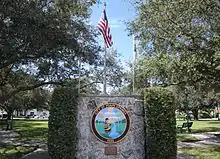
Miami Springs was founded by an aviation pioneer, and thus, the fate of the city has always been intertwined with the aviation industry, particularly since Miami International Airport (MIA) is located just south of the city on the southern border of NW 36th Street. The airline industry brought many residents from airline crew bases, as well as employment opportunities at the airport, which brought much prosperity to the city. This dependence, however, left the city vulnerable. The sudden 1991 collapses of both Eastern Airlines and Pan American World Airways left many Miami Springs residents unemployed and unable to afford living in the neighborhood. Given that the businesses in Miami Springs had always relied upon the large disposable incomes of the employees of the large airline carriers, the bankruptcy of both corporations in the same year created a chain reaction, eventually causing many small businesses to close their doors. Despite the closure of the airlines, from a residential standpoint, Miami Springs remained strong. The city is often seen as blessedly isolated from the perceived turbulence of the rest of Miami-Dade County. This has continued to provide ample replacements for the older residents who are lost over time. Nonetheless, the legacy of the airline closures remains. Residential millage taxation rates hover near the state mandated maximum.
Economy
The Consulate-General of Bolivia in Miami is located in Suite 505 at 700 South Royal Poinciana Boulevard in Miami Springs.[12]
Significant historical landmarks
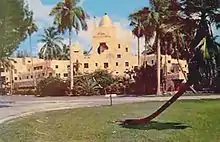
Curtiss Mansion is a Pueblo style home that belonged to city founder Glenn Curtiss. Beginning in the late 1970s, the house was subject to vandalism and a number of fires. In 1998, a public/private partnership of Curtiss Mansion, Inc., and the city of Miami Springs embarked on a lengthy restoration project, completed in 2012.[13]
Fair Haven Nursing Home is one of the oldest buildings in Miami Springs and is built in the pueblo style favored during the initial development. The building was designed by architect Bernard E. Muller. It was designated a Miami Springs Historic Site in 1984.
A simple timeline of events:
- 1926 - Country Club Estates incorporated
- 1927 - Hotel Country Club officially opened
- 1930 - Miami-Battle Creek Sanitarium opened
- 1942 - Sanitarium leased to US Army
- 1945 - Sanitarium reopens
- 1959 - Miami-Battle Creek Sanitarium becomes The Palm Spa
- 1962–Present - Fair Havens Center

Before becoming a nursing home, the building served as the Hotel Country Club. The hotel was built by Glenn Curtiss and partners, and was intended to promote the development of the then-new Country Club Estates. It was furnished in a Southwestern style, with Navajo rugs on the floor and handcrafted solid mahogany furniture. In 1929, after the crash, Curtiss sold the hotel to his friend John Harvey Kellogg, who renamed it the "Miami Battle Creek Sanitarium" and operated for many years. During World War II, it served the Air Transport Command as a hospital for recuperating military personnel. Later it became a home for the elderly, which it still is today.[14]
A 'Virtual Tour of Historic Miami Springs' can be done on the City of Miami Springs website: https://www.miamisprings-fl.gov/tour
Education
The city of Miami Springs is served by a sizeable number of public and private educational institutions.
The city is part of the Miami-Dade County Public Schools System (M-DCPS), and all public schools under this system follow guidelines set forth by the Florida Department of Education. Miami Springs is served publicly by:
- Miami Springs Senior High School
- Miami Springs Middle School
- Miami Springs Elementary School
- Springview Elementary School
Two charter schools serve Miami Springs:
- Glenn Curtiss Elementary AIE Charter School (Academy for International Education) provides K–8 education.[15]
- ISAAC Academy (Integrated Science and Asian Culture) provides K–8 education.[16]
Private schools in Miami Springs are largely provided by local religious institutions:
- All Angels Episcopal Church operates All Angels Academy[17] for children of a similar age group.
- Blessed Trinity Catholic School[18] of the Roman Catholic Archdiocese of Miami is located in nearby Virginia Gardens,[19][20][21] and provides K–8 education.
- Grace Lutheran Church operates Grace Lutheran Learning Center for children of a similar age group.[22]
References
- 1 2 "2022 U.S. Gazetteer Files: Florida". United States Census Bureau. Retrieved December 27, 2022.
- ↑ "P1. Race – Miami Springs city, Florida: 2020 DEC Redistricting Data (PL 94-171)". U.S. Census Bureau. Retrieved December 27, 2022.
- ↑ "U.S. Census website". United States Census Bureau. Retrieved January 31, 2008.
- ↑ "US Board on Geographic Names". United States Geological Survey. October 25, 2007. Retrieved January 31, 2008.
- ↑ Source: "Escape from the Southwest: The Pueblo Style in Minnesota and Florida" by Carl D. Sheppard and Stephen D. Schreiber in Pueblo Style and Regional Architecture; Nicholas C. Markovich, Wolfgang F.E. Preiser, and Fred Sturm (Eds.)
- ↑ "US Gazetteer files: 2010, 2000, and 1990". United States Census Bureau. February 12, 2011. Retrieved April 23, 2011.
- ↑ "Census of Population and Housing". Census.gov. Retrieved June 4, 2015.
- ↑ "Explore Census Data". data.census.gov. Retrieved February 8, 2022.
- ↑ "S1101 HOUSEHOLDS AND FAMILIES - 2020: Miami Springs city, Florida". United States Census Bureau.
- ↑ "S1101 HOUSEHOLDS AND FAMILIES - 2010: Miami Springs city, Florida". United States Census Bureau.
- ↑ "MLA Data Center Results of Miami Springs, FL". Modern Language Association. Retrieved October 31, 2007.
- ↑ "Servicios Consulares Archived 2009-02-19 at the Wayback Machine." Embassy of Bolivia in the United States. Retrieved on January 30, 2009.
- ↑ Daley, Bill (March 29, 2012). "Curtiss Mansion ready for public". Miami Herald. Retrieved April 3, 2012.
- ↑ Hotel Country Club (Fairhavens), history
- ↑ Glenn Curtiss Elementary AIE Charter School official website
- ↑ ISAAC Academy official website
- ↑ AllAngelsAcademy.org | Home
- ↑ Blessed Trinity - Home
- ↑ "Home". Blessed Trinity Catholic School. Retrieved May 6, 2020.
Address: 4020 Curtiss Parkway Virginia Gardens, FL 33166.
- Comparison with the zoning map shows that it is physically in Virginia Gardens. - ↑ "Zoning Map" (PDF). Virginia Gardens. Retrieved May 6, 2020.
- ↑ "Directory of Catholic Schools 2019-2020" (PDF). Roman Catholic Archdiocese of Miami. p. 6. Retrieved May 6, 2020.
Blessed Trinity 4020 Curtiss Parkway Miami Springs, FL 33166
- ↑ Grace Lutheran Learning Center - Miami Springs, Florida - FL - school overview
External links
- Official website
- MiamiSprings.com Community site
- SpringyLeaks Miami Springs news
